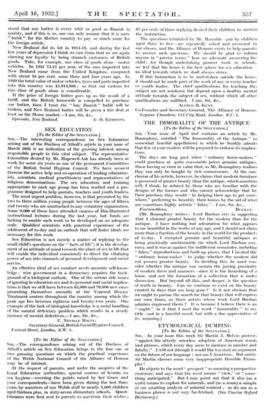THE IMMORALITY OF THE ANTIQUE
[To the Editor of the Ses:cvAyon.]
SIR,—Your issue of April 2nd contains an article by Mr. Boumphrey, entitled "The I lllll uwality of the Antique" (a somewhat fanciful appellation) in which be frankly admits that few of your readers will he prepared to endorse its Unpile:a- t ions.
The days are long past when " ordinary home-makers " could purchase at quite reasonable prices genuine antiques. these having so risen in value that, as Mr. Boumphrey realizes they can only be bought by rich connoisseurs. At the con- clusion of his article, however, he claims that modern furniture is possessed of greater beauty than the antique, which assertion will, I think, be refuted by those who are familiar with the designs of the former and who cannot acknowledge that -by their purchase they would " be helping their age to get some- where," preferring to beautify their homes by the aid of what are sometimes highly artistic " fakes.'--1 am, Sir,.
[Mr. Boumphrey writes : Lord Buthan errs in suggesting that I claimed greater beauty for the modern than for the antique. I have nothing but admiration for what appears to me beautiful in the works of any age, and I should not claim more than a fraction of the beauty in the world for the products of to-day. I excepted genuine and beautiful antiques as being practically unobtainable (in which Lord Buchan enn- curs), and it was as against the indifferent remainder, including "fakes," reproductions and built-up pieces, that I invited the "ordinary home-maker" to judge whether the modern did not possess greater beauty. In deciding this, he must con- sider whether the antique can sustain the jarring proximity of modern dress and marmers—since it is the furnishing of a home, and not the formation of_ a collection that is under discussion. But beyond all this, and deeper, is the question of truth in beauty. Can we continue to exist on the beauty created in days that are long gone ? Is it not obvious that. we ought to pursue the search for that beauty that will express our own times, as those artists whose work Lord IIIR1/1111 admires expressed theirs ? It is because I believe there is an " ought " in it that I used the word " immorality " in my title—not in a fanciful mood, but with a due appreciation of its meaning.!








































 Previous page
Previous page